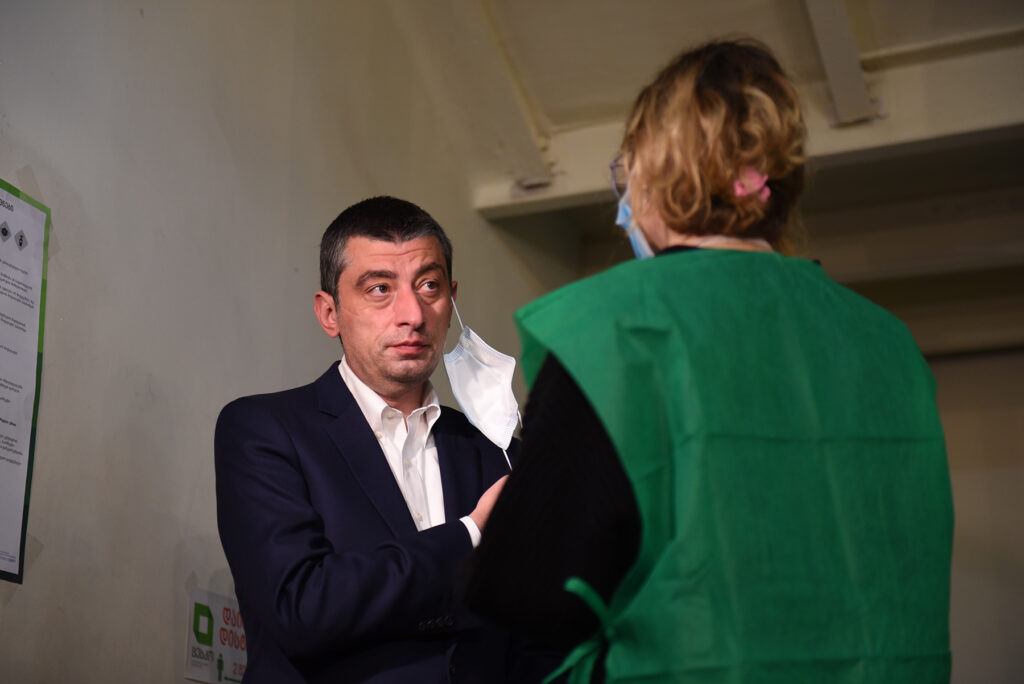Prime Minister Giorgi Gakharia has resigned as Georgian Prime Minister, citing an arrest warrant issued for opposition leader Nika Melia.
Gakharia announced his resignation on Thursday morning stating he had differences of opinion with other members of Georgian Dream. He warned that the arrest of Nika Melia, the chair of the United National Movement Party (UNM) was a dangerous political escalation and was ‘unacceptable’.
Tbilisi City Court ordered Melia’s arrest on Wednesday for violating his bail conditions, leading to widespread condemnation from opposition groups and concern from Georgia’s Western allies.
[Read more on OC Media: Georgian parliament again deprives opposition leader of immunity]
At a press briefing at the UNM’s offices, Melia said that he ‘appreciated’ Gakharia’s decision and that there was now an ‘urgent need’ for a meeting with the government to discuss new elections.
‘The fact that Mr Gakharia resigned means that he practically admitted that there would have been bloodshed and violence here.’
Melia also said that snap-elections were the only way to end the crisis in Georgia.
In his resignation speech, Gakharia said he hoped his resignation would reduce political polarisation.
‘It is my firm position that the execution of justice against one specific individual, even lawfully, if it risks the health and lives of our citizens or generally creates a risk for political escalation in the country, is unacceptable.’
He said that such a move should only have happened if there were no risk for escalation, ‘especially when political tensions and polarisation are putting the country’s development, security, and very future in jeopardy, when we all together, with our citizens, are fighting pandemic, economic crisis, regional challenges, and what’s more important, we all together are fighting polarisation to create a better future for our children.’
‘Taking into account that I and my team failed to reach a common agreement over this matter, I’ve decided to resign from my position. Of course, I believe and want to believe that this will contribute to reducing polarisation in our country’, he concluded.
During his speech, Gakharia also criticised Melia for not respecting the law, and accused him of encouraging protesters to break into the parliament on 20 June 2019, for which he is awaiting trial.

Shortly after Gagkharia's resignation, the Interior Ministry announced that they had postponed the execution of Melia’s arrest.
In a statement that soon followed, the Georgian Dream chair Irakli Kobakhidze said party leaders ‘did not hear’ good arguments from Gakharia. Kobakhidze called on Nika Melia to ‘obey the law’, adding that he would still be detained.
Parliament are expected to vote on a new prime minister and cabinet within two weeks. If parliament fails to approve a candidate, within four weeks, the President will disband parliament and call new elections.
Gakharia’s resignation comes just a year and a half after he was appointed. He was confirmed in September 2019, 80 days after the dispersal of the July anti-government protests that left dozens injured. At the time he served as Georgia’s Interior Minister and Vice Prime Minister.
A Lomonosov Moscow State University graduate and former Lufthansa executive, he was recruited into politics by Bidzina Ivanishvili, the founder of Georgian Dream party who ‘retired from politics’ last month.
Before becoming interior minister, he served as Economy Minister, Chair of the Economic Council, and Business Ombudsperson under Georgian Dream’s government.
‘Persecution’ of opposition leader
The case against Melia has inflamed tensions between the opposition and the government, which came to the fore following 31 October’s disputed elections.
Following the ruling, the US Embassy in Tbilisi, who have been attempting to broker an agreement between Georgian Dream and the opposition, called on both sides to ‘exercise maximum restraint’.
‘Violence serves no one except those who want to undermine Georgia’s stability. This must be resolved peacefully’, they said in a statement.
The Embassy released a second statement shortly before Gakharia’s resignation. ‘The current dangerous situation following the Melia ruling stems from decades-long problems with the electoral system and the judicial system. It is imperative the authorities and opposition exercise maximum restraint this morning. The way to address the important issues at stake is through peaceful negotiation. We urge all involved to remain calm and avoid violence.’
Gigi Ugulava, a leading member of the opposition European Georgia Party, told journalists that Gakharia’s resignation gave space for negotiations with the government about snap elections, releasing ‘political prisoners’, and electoral reform. ‘The government should acknowledge that there is no alternative to negotiations’, he said.
Supporters and allies of Nika Melia, who was recently elected chair of the largest opposition group in Georgia, mobilised at the UNM party offices in Tbilisi on Wednesday night and spent the night there. They vowed to prevent Melia’s anticipated detention after the Tbilisi Court ruling.
On Wednesday night, Judge Nino Chakhnashvili, who government critics accused of being in the service of the ruling Georgian Dream party, ordered Melia to be detained over his refusal to pay bail pending trial over the 20 June 2019 Tbilisi protest.

Eighteen opposition parties, including European Georgia, the Labour Party, Lelo for Georgia, and Strategy Aghmashenebeli labelled the move against Melia ‘persecution’.
‘All opposition parties stand peacefully in solidarity with Mr Melia and the UNM in resisting Georgian Dream’s obvious push towards full-blown authoritarianism’, a joint statement released in the early hours of 18 February read.
Several opposition leaders did not rule out physically resisting police officers oif they attempted to apprehend Melia.
The Interior Ministry issued a warning against any obstruction of officers on Thursday morning, promising to deal with anyone attempting to do so to ‘the full extent of the law’.
Melia’s arrest was ordered after parliament greenlit a request by the Prosecutor’s Office to remove his parliamentary immunity, the second time Georgian Dream MPs have approved this.




 18 February 2021
18 February 2021



